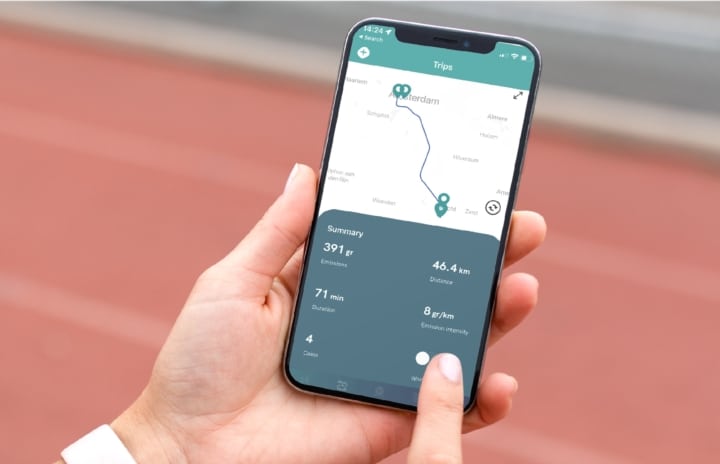This is what the Norming Regulation Work-Related Personal Mobility mean for employers
Update! The name of this regulation has been changed to:
Reporting Requirement Work-related Mobility of Persons
Read all about it on this page.
Do you have more than 100 employees? Then from 2024 onward, you are obliged to provide data on the commuting and business travel of your employees. The Normative Regulation of Work-related Passenger Mobility Act, or NRWP for short, is part of the climate agreement and forms the basis of mandatory CO2 reporting. With these regulations, the government wants to achieve a reduction of 1 megaton of CO2 emissions per year by 2030. A fine intention. However, keeping track of kilometer registration within your organization is a huge task. How do you tackle this as an employer? Which handy tools will help? And what are the consequences if you do not comply with the rules? You can read it here.
Stimulate sustainable mobility
The climate agreement presented in 2019 is clear: CO2 emissions in the Netherlands must go down. In fact, by 2030 they must be reduced by 49% compared to 1990. The government must therefore work hard. Because reducing CO2 emissions is not easy. To illustrate: 1 megaton of CO2 is approximately equal to 4,200,000,000 kilometers for a medium-sized gasoline car. This is 105,000 times around the world. Of course, this varies by type of car, brand, consumption, etc.
Indeed, commuting and business mobility together account for almost half of CO2 emissions from private cars. So it is clear where profits can be made. The mandatory CO2 reporting gives the government, employers and employees more insight into the kilometers driven and the corresponding emissions. Sustainable mobility is expected to gain momentum this way. The first results will be measured in 2025. Are the figures on track? If so, they will remain annual reports. If not, additional measures are expected to follow. Such as a maximum CO2 emission per employer.
To who does the mandatory CO2 reporting apply?
Do you have 100 or more employees, on January 1 of the calendar year for which you are reporting? As an employer, you are obliged (from 2024) to report annually the CO2 emissions of your employees. Do you have multiple branches in the Netherlands that are registered at the Chamber of Commerce under the same trade registration number? Then you report on all branches together. Branches outside the Netherlands are not taken into account.
Exactly what data should you report?
Through the CO2 report, you provide data on the number of travel kilometers of your employees. These are the kilometers traveled per year for commuting and business purposes with a certain means of transport and/or fuel type. To collect this data, as an employer you need to keep three partial records. Namely, for lease/own fleet, mobility services and expense claims. For each of these administrations, you register the travel kilometers of your employees. This is how you calculate the CO2 emissions as accurately as possible.
You must submit the figures for the past calendar year no later than July 1. Because the mandatory CO2 reporting will take effect from July 1, 2024, you must submit your first report by July 1, 2025, at the latest. Do you not submit the requested data, or do you not meet the requirements? Then you may be fined and there will be stricter supervision of your CO2 reporting. Of course, you don’t want that.
As an employer, make sure you have everything in order before July 1, 2024. Because from this date you must have the administration system set up and record CO2 emissions correctly for the mandatory reporting.
Make mandatory kilometer registration a lot easier and more fun
Fynch makes tracking business kilometers within your organization a lot easier. Fynch helps you with the points below and takes a lot of the burden off your shoulders. This will save you 2 hours per employee, per month.
- Automatic trip recording
The app differentiates by means of transportation and purpose of travel. Per trip made, the CO2 emissions are calculated. The app records the start and end location, means of transport and route of each trip with 95% accuracy. The employee indicates whether a trip is business, private, or commuting. - CO2 reporting (mandatory from January 1, 2024)
The app tracks the development of CO2 emissions within your organization. You get insights and annual reporting in real-time 24/7 via the Fynch Impact Monitor. This way you are ready for the new reporting legislation, of which kilometer reporting is an important part. - Keeping records
The app helps both the employee and the organization with the daily administration and reporting of travel expenses and home office days. Fynch thus calculates the amount of monthly travel and homework reimbursement for all employees based on the reimbursement rates applicable to your company. You will receive this data from Fynch monthly, including proof for the tax authorities. - Encourage sustainable travel behavior
The Fynch app can automatically award employees a higher kilometer reimbursement if they choose sustainable mobility, such as biking. The app also rewards employees for active and sustainable travel behavior. For example, they can participate in challenges and spend earned coins in Fynch’s (members-only) sustainable marketplace. In this way, sustainable mobility becomes extra fun.
Before you know it, it will be 2024. Start registering all kilometers and CO2 emissions on time. Fynch is happy to help you with this. Contact us for the possibilities. Other employers have already gone before you. Want to know more? Read here how other companies experience Fynch.

